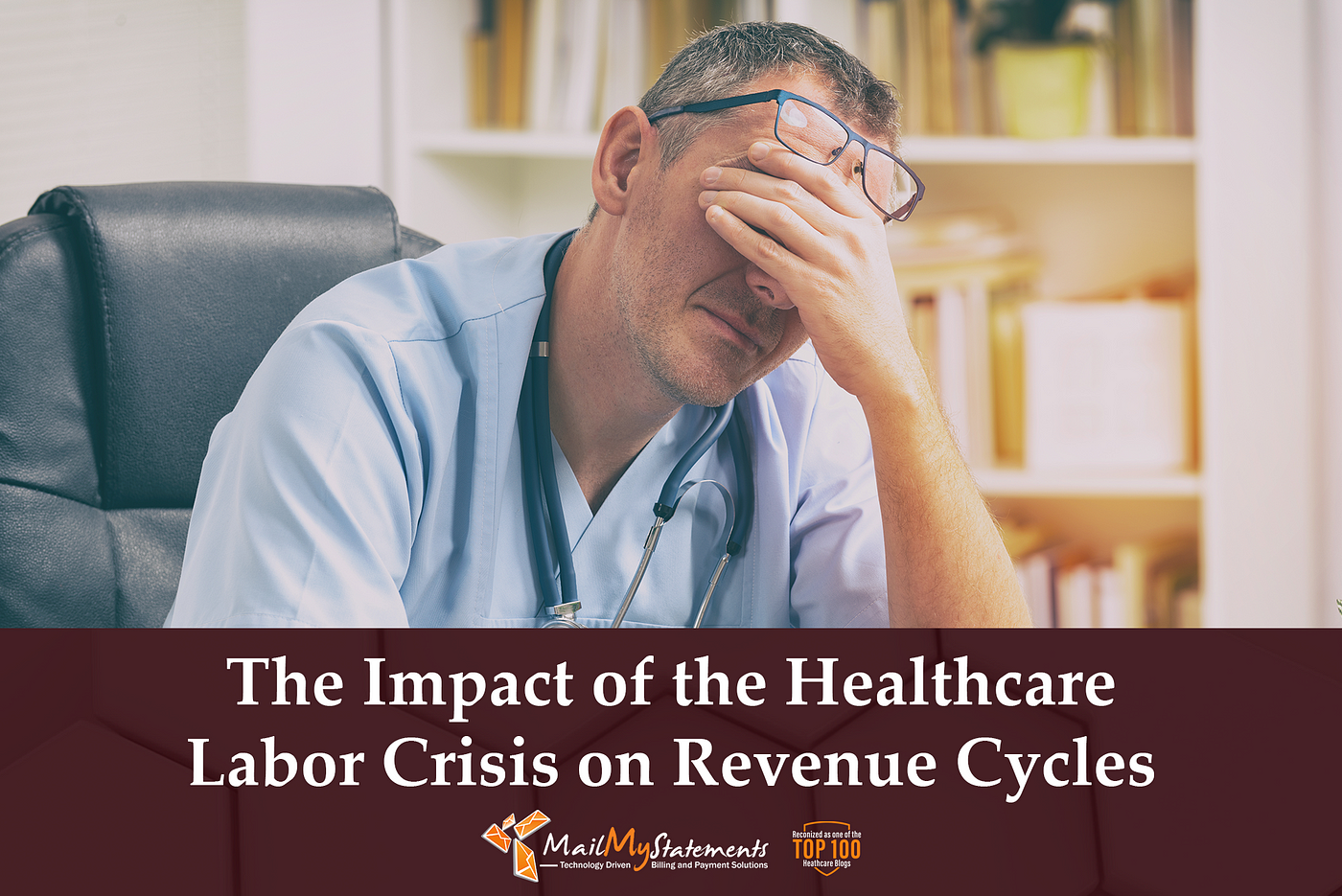The Impact of the Healthcare Labor Crisis on Revenue Cycles

Covid-19 has had far-reaching effects on all aspects of the economy, from setting the stage for eventual inflation to dramatic fluctuations in employment rates. One of Covid’s ongoing ripple effects has been the current healthcare labor crisis in the United States.
The labor crisis is making automation more important than ever for healthcare systems, hospitals, and medical offices throughout the country. With an aging population in need of care and a shortage of administrative and billing staff, it is becoming increasingly difficult to provide attentive and prompt customer service, and revenue cycles are slowing as a result. Automation can help fill the gap by reducing the need for human labor and also improving the patient experience in the process.
What is the labor crisis?

The labor crisis describes the current employment situation in the U.S., in which there is a shortage of workers to fill available job openings. Labor shortages can occur in specific sectors and industries due to waves of retiring workers without adequate replacement and a number of factors, but the current labor crisis was primarily sparked by the pandemic and the subsequent “Great Resignation,” during which 47 million workers quit their jobs.
In the medical field, the effects of Covid have been profound; staff are feeling burned out, overworked, and leaving their jobs in record numbers. As of October 2021, one-fifth of healthcare workers chose to leave their jobs during the pandemic due to poor pay and burnout; of those who stayed, 31 percent stated that they are considering leaving their jobs in the future.
The labor crisis has made it difficult for all businesses to find qualified employees and, in the healthcare sector, it has resulted in a decrease in the quality of care and customer service. Doctors’ offices and healthcare systems are facing shortages of front office staff, coders, accounts receivable, billers, and denial management personnel, leading to increasing frustration from patients and delays in payments.
The impact of the healthcare labor crisis on revenue cycles
One consequence of the healthcare labor crisis is the significant impact it is having on revenue cycles.
While a shortage of nurses, doctors, and other medical staff is placing stress on the entire healthcare system, administrative staffing shortages are causing slower filing times for medical bills and a lack of follow-ups when payments aren’t made in a timely manner. This is leading to a decrease in reimbursement rates and an increase in the amount of time it takes to collect payments.
Without a skilled workforce to handle billing, medical practices are also seeing an increase in denials from insurance companies due to a lack of documentation and errors in coding. Healthcare system executives cite improvements to medical coding and billing as critical to preventing avoidable claim denials, but increased workloads and new requirements for claims related to Covid-19 make these improvements difficult without changes to the underlying system.
These factors combine to create delayed cash flows. When doctors, hospitals, and other healthcare providers can’t collect payments, it has a negative impact on their bottom line. This can put a strain on working capital and make it difficult to invest in new technologies or hire additional staff, further exacerbating the labor shortage problem.
Delayed cash flows also mean that providers are more likely to experience financial difficulties, both personally and in running their businesses; rural healthcare providers are especially impacted, with rising rates of rural hospital closures. Experts point to innovative financial solutions as one of the best ways for rural hospitals to bridge the revenue gap and increase efficiencies in order to continue serving their communities for decades to come.
Why automation and digitization are more important than ever
Automation and digitization can help to alleviate many of the pressures caused by the labor crisis. By reducing the need for human labor, medical practices have the capacity to provide more direct, higher-level customer service to patients, while lower-level, repetitive tasks are automated. Automation can also help improve the quality of service offered by reducing errors and increasing efficiency, keeping the revenue cycle moving.
Digital tools can help healthcare systems and medical practices streamline their operations and reduce their reliance on tedious manual processes. When routine, labor-intensive tasks are automated, it allows administrative staff to make better use of their time. This can lead to faster filing times for medical bills and more effective follow-ups; all of this adds up to better service and support for patients.
An example of this is claims status automation and payment portals. By automating the claims process, healthcare systems and medical practices can reduce errors, improve their reimbursement rates, and ease the burden of labor shortages. Digitization and automation are less labor-intensive and costly than off-shoring billing and administrative tasks, and costs-to-collect are reduced significantly when shifting this work from in-office staff to a user-friendly automated system.
Final Thoughts
MailMyStatements offers our clients a streamlined process to take the stress out of billing. Our plug-and-play solution will lower your overhead expenses and improve patient experience, all while reducing your need for in-office billing and administrative labor. Your team can focus on providing one-on-one support to patients who have complex questions while we handle the rest.
With MailMyStatements, you can offer your patients advanced features like text to pay and allow them to keep their cards on file for hassle-free payments. No matter the size of your practice, you can provide the seamless payment experience patients expect these days, with a branded payment site and white-label payment gateway solutions.
By investing in automation and digitization, healthcare providers can prepare for the future and ensure that they are able to provide quality care and customer service in the face of the labor crisis. If you’d like to learn more about MailMyStatements, contact us today to get started.

Derek Griffin is the VP of Sales and Business Development for MailMyStatements. He has over 13 years of experience as a healthcare sales executive, is experienced in multiple healthcare related fields from front office to billing and collections, and has worked in various roles within Optum, a UnitedHealth Group company and AdvanecedMD. He loves spending free time with his wife and kids, whether it is coaching the soccer team, attending dance recitals, or fixing bikes.
You can follow Derek on Twitter @Derek_Griffin1
Comments
Post a Comment